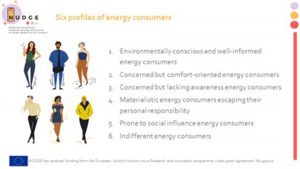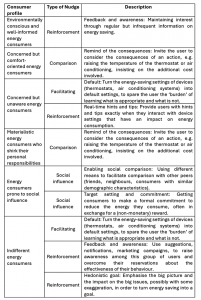A Europe-wide survey has identified six types of energy consumers and the appropriate nudges needed to promote sustainable behaviour.
The NUDGE survey, available in 15 languages and filled in by more than 3,000 people in 29 countries, made it possible to gain a better understanding of energy consumers’ behaviour in relation to energy efficiency and the factors that act as barriers or facilitators to energy saving.
The survey identified six different consumer profiles, and based on their distinct characteristics, the most appropriate nudges were defined, which are described below.1
Environmentally conscious and well-informed energy consumers
Besides being concerned about environmental matters and aware of the consequences of irresponsible energy-related behaviour, they are well informed about ways to save energy. They bear a strong sense of personal responsibility for acting in an energy-friendly manner, and the possibility of sacrificing some of their comfort to do so does not stand as a barrier to acting this way.
This class of consumers is the one in minimum need of an intervention treatment. The main requirement is to keep them sensitised about energy-saving, and this can happen through simple reinforcement nudges such as regularly providing them with information about energy-saving and the positive consequences of their behaviour.
Concerned but comfort-oriented energy consumers
Their overall intention to adopt an energy-saving behaviour is high, and this is supported by high concern about the environment and a good understanding of the risks involved in energy-wasting ways.
Nevertheless, the intentions of these consumers are clearly weaker when the question is about energy-saving with respect to heating and cooling.
For this energy consumer class, the interventions can target their concern about the financial implications of energy consumption. Otherwise, it is not straightforward to cope with their concerns about losses in terms of personal comfort.

Concerned but lacking awareness energy consumers
Their stated intentions to save energy can be strengthened, both specifically with respect to heating and, more generally, with respect to other energy-consuming activities (use of appliances, kitchen, lighting).
The lack of knowledge about practical ways to save energy serves as a barrier to an unconditionally positive attitude towards energy-saving. The latter exists, even in a less profound way than in the first benchmark segment.
This group of users can be nudged in two ways: either by securing default operational conditions that favour energy-saving, essentially bypassing the missing know-how barrier, or by trying to (gradually) render it obsolete by gradually educating and training people in the optimal energy-saving behaviours.
Materialistic energy consumers escaping personal responsibility
This group lags in overall energy-saving intentions. Neither concern about the environment, nor knowledge about ways to save energy are missing in their case. Yet, whereas they claim awareness of the consequences that increasing energy demand bears for the environment and society, they do not accept their own share of the responsibility to act on this.
On the other hand, and this gives some hope for their treatment, they demonstrate high concern for the height of their energy bills and the monetary fingerprint of energy-saving activities. The key barrier to its energy-saving behaviour cannot be treated, at least in an obvious and generic manner, by interventions of the nudging type.
Nevertheless, nudging can exploit their sensitivity to the financial aspects of energy-related behaviour and focus on the possible direct monetary savings that are feasible with energy-saving.
Prone to social influence energy consumers
They attribute high value to the fact that people they deem important in their lives approve of and support energy-saving, which sets a strongly favourable behavioural prototype. Hence, this form of indirect social pressure serves as a facilitator of energy-saving in their case.
The main goal of this group of consumers is to exploit their vulnerability to norms and social pressure. The idea of exposing users to social comparison is one of the most explored ones in experiments around nudging, including those related to energy-friendly behaviour.
Goal-setting programmes, on the other hand, are viewed as smart ways to elicit consumers’ commitment to save on what they consume.
Indifferent energy consumers
Indifferent energy consumers are users demonstrating profoundly low intentions for energy-saving. They doubt their own capacity to adopt energy-saving behaviour as well as the impact this can have on the energy-saving challenge, shaping their overall attitude towards energy-saving on the negative. They are nowhere close to the energy-saver prototype (which they do not find favourable anyway) and they do not perceive social pressure to adopt energy-saving behaviour.
The characterisation of the group showed that these users also share, on average, the lowest levels of environmental concern and energy awareness and the lowest pressure from norms of any kind.
Hence, much work may be needed with his group of energy consumers on multiple fronts.
Spanning from environmentally conscious to indifferent energy consumers, these six profiles embody the features that hinder energy-saving behaviours and consequently encourage specific interventions on them. This allows the NUDGE consortium to provide consumers with practical ways to reduce energy consumption.

The project “NUDging consumers towards enerGy Efficiency through behavioural science (NUDGE)” has received funding from the European Union’s Horizon 2020 research and innovation programme under Grant Agreement no. 957012. The sole responsibility for the content of this publication lies with the authors. It does not necessarily reflect the opinion of the European Union. Neither CINEA nor the European Commission are responsible for any use that may be made of the information contained therein.

This article is part of the exploitation activities carried out by Cittadinanzattiva/Active Citizenship Network in the context of the EU funded project “NUDging consumers towards enerGy Efficiency through behavioural science (NUDGE)” with the support of INNOVATION NEWS NETWORK.

References
1 Nudge project, “Report “Profiling of energy consumers: psychological and contextual factors of energy behaviour” Authors: S. Van Hove, M. Karaliopoulos, L. Tsolas, P. Conradie, M. Amadori, I. Koutsopoulos, K. Ponnet. www.nudgeproject.eu/wp-content/uploads/2021/10/D1.1-Profiling-of-energy-consumers-psychological-and-contextual-factors-of-energy-behavior-FINAL.pdf









